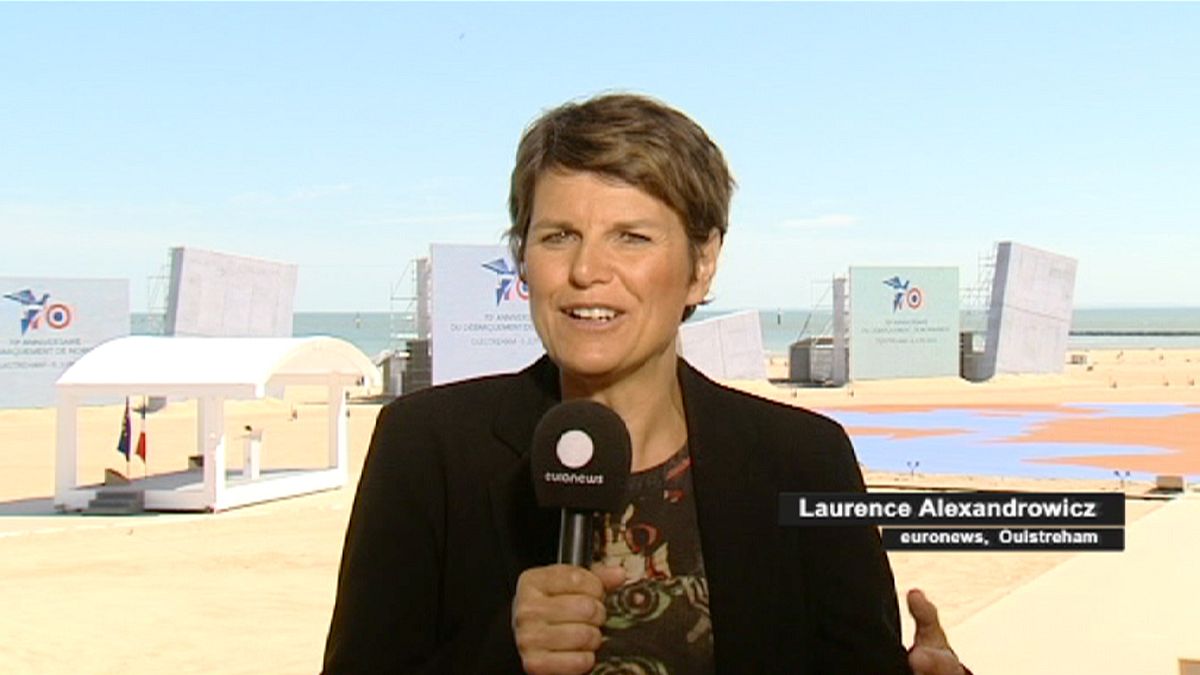World leaders and veterans have gathered by the beaches of Normandy under clear blue skies to mark the 70th anniversary of World War Two’s D-Day landings – history’s largest amphibious assault on June 6, 1944, when 160,000 US, British and Canadian troops waded ashore to confront Nazi Germany’s forces, hastening its defeat.
Euronews correspondent Laurence Alexandrowicz was in Normandy for the anniversary.
Olivier Péguy, euronews:
“It is a major date in history: June 6, 1944; 70 years ago: the allied D-Day landings in Normandy, marked by many commemorative ceremonies. Laurence Alexandrowicz, You are our special correspondent in Normandy, at Ouistreham to be precise. Tell us how the whole region has been decked out for the occasion.”
Laurence Alexandrowicz, euronews, Ouistreham :
“Yes, Olivier, the region is decorated with the colours of D-Day everywhere – on the houses, on the town halls, with American, British and Canadian flags depending on the beaches where the Allies landed. There are also posters with this slogan: “We are all 70” and we met an American tourist who told us that she was deeply touched by this expression.
“The museums are packed. There are lots of tourists. The restaurants and the hotels were fully booked months ago. And for days now you have been able to see on the streets, on all the roads in Normandy, military vehicles from that time: jeeps driven by people dressed in period costume. There are enthusiasts from across the world; from France, lots from Belgium – and from Britain too. There are even Russians who have come in jeeps from Moscow.”
euronews:
“Laurence, you have also been meeting veterans. There are many of them – Americans, British, Canadians. They are all over 80 years old. What does it mean to them to be there?”
Laurence Alexandrowicz, euronews, Ouistreham:
“This ceremony is exceptional because it is doubtless the last time that many of them will be able to come and take part in an anniversary like this, so there is a lot of emotion. The feelings you get from most of them is their immense joy to be here, and a lot of pride and when you talk to them and interview them, there is always a little tear in the corner of their eye because they are obviously remembering their comrades who fell on the beaches. The tourists who meet them have a great fondness for these veterans…1,800 were expected in Normandy and these veterans have their photos taken with the tourists, people give them a hug. We saw a group of three Americans singing a little song from the 1940s to a 94-year-old veteran – the same one who said to us jokingly: ‘I haven’t told you everything because I am holding some back for the 80th and the 90th anniversary’. And there is something else that comes across, too: they are afraid of another war. They talk about it and they are sorry that their sacrifice has not resulted in a much more peaceful Europe and world.”
euronews:
“By and large, war-related commemorations attract a lot of French and foreign tourists. Why is that, Laurence?”
Laurence Alexandrowicz, euronews, Ouistreham:
“Well, it has to be said that this is a particularly remarkable year, with the allied landings being marked at the beginning of June – the 70th anniversary of D-Day – and at the end of the month, in Sarajevo, there is also the centenary of the start of the First World War.
“And I think that when times are hard, people cling to those values conveyed by the young soldiers who came to free France and Europe. There are a lot of tourists, notably Americans, who have told us how important is was for them to honour the dead. And, as I was saying, in 10 years time, there maybe won’t be any veterans left. That is why there are particularly large numbers this year. And between June and September in Normandy, 8 million tourists are expected for the 400 events linked to this D-Day anniversary.”


